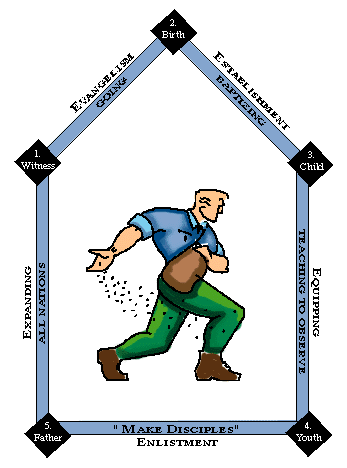Published: 03 October 2010 Written by Bob Stone
Matthew 28:18-20
Today you embark on an exciting journey of studying God's Word, but I want it to be clear that this study will be worthless to you unless you hear it and act on it. Therefore, it is very important that you find someone with whom you will work this through: a friend, a mate, a small group. As you are going to see, it is absolutely critical to your spiritual development.
Discipleship is obviously not our idea, but the Lord's! He modeled it with the disciples, and mandated it in His commandment in Matthew 28:18-20. Let's look at that passage.
Then Jesus came to them and said, "All authority in heaven and on earth has been given to me. [19] Therefore go and make disciples of all nations, baptizing them in the name of the Father and of the Son and of the Holy Spirit, [20] and teaching them to obey everything I have commanded you. And surely I am with you always, to the very end of the age."
There is only one command in that passage; however, depending on who you talk to, you'll hear various ideas about what it is. For example, if I go to speak at Youth with a Mission (YWAM) in Montana and ask what the central command in Matthew 28:18-20 is, they'll say, "Go." But that isn't it. The command is simply, "Make disciples." The other parts of the commission serve to explain what it means to make disciples. "Going," "baptizing," and "teaching" are all participles explaining and elaborating on what discipleship is about. Here we have the essence of discipleship!
Going isn't a command—it's assumed. This should read, "as you are going." Baptizing is an outward expression of an inward reality. Content is also vital, so teaching and applying are crucial to the process of discipleship (teaching disciples to hear and to apply).
Matthew 28 also pinpoints the source of our power: All authority on heaven and earth has been given to me, Jesus said. He is the authority, and from that position of authority gives us the command and the power to carry out his charge. All of discipleship, all ministry is impossible apart from the power of God and our Lord's commission.
So the priority activity is to make disciples. Evangelism (going) is the first element. Jesus commands us to go into our everyday world. Discipleship must affect that day-to-day; if it's something that's done in a separate spiritual compartment, we are missing the whole idea.
Baptizing has to do with establishment or initiation in the faith. When someone is evangelized and introduced to Christ, the next step is to establish that person in the faith. We must start right! There are many steps of initiation, but that which highlights and overshadows them all is baptism—a believer's opportunity to declare publicly that he is a disciple of the Lord; he is His. As adults or children who come to the point of understanding exactly what we are committing to, we are in fact saying, "I am the Lord's disciple."
Teaching is the next step: equipping to obey. Obedience is proof that we have heard!
Finally, Jesus reassures us of His presence: "And surely I am with you always, to the very end of the age." Jesus is the chief model of discipleship. Not only is He our example; He is actually with us! In our day, we enable and encourage the continued discipleship of Jesus, for He is still actively discipling people today.
 This chart introduces the disciples' commission and the philosophy behind Hillcrest Chapel's approach to ministry—our direction in terms of teaching, equipping and discipleship.
This chart introduces the disciples' commission and the philosophy behind Hillcrest Chapel's approach to ministry—our direction in terms of teaching, equipping and discipleship.
We make the contact, we evangelize, and as a result of that contact we have a convert! What do we do with that new convert? Do we just leave him/her out in the street and say, "God bless you—go for it?" Of course not; we take time just as we would with a baby, nurturing that new convert until he/she has an understanding of a new identity in Christ. He must be established, and know what it means to be a disciple. He has to understand that it's not just about having eternity right with God, it's also about being a worker, a minister.
So we take that disciple and equip him/her in ministry. From that worker pool some will eventually emerge as leaders, who will shepherd the flock. From those, there will be some who will be involved in cross-cultural and all kinds of ministry service.
Now what are all the lines on our chart about? They illustrate that wherever you are in the process, you have the opportunity to give away what you have received. If you're a disciple, then, you can go back and evangelize and help a person become established in the faith. If you have a disciple who is now in ministry, you can go back and do whatever you want in terms of contact, bringing conversion, or discipling. The exciting thing is that this mission starts here and can end up taking place around the world.
Now it's time to take inventory of your spiritual life, to see where you are in the journey. What will determine our success? The answer is found in our spiritual heart.
|

|
 EMF Form Builder
EMF Form Builder